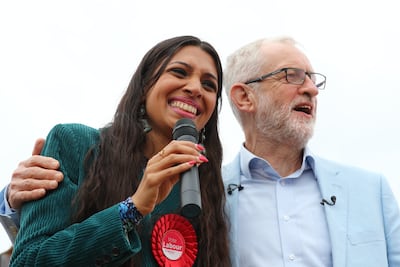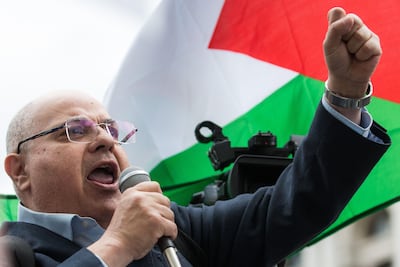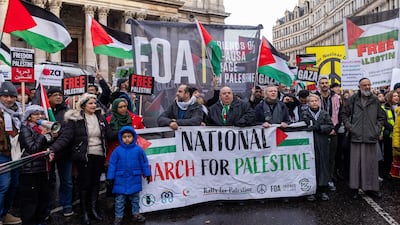Live updates: Follow the latest news on the UK general election
Accusations of a Labour “purge” of its left-wing candidates have given momentum to the growing movement of independents who are challenging the party's stance on Gaza.
Many of these independent candidates emerged alone, but have since formed alliances with other left-wing groupings, in line with policies promoted by former Labour leader Jeremy Corbyn.
Labour leader Keir Starmer has suffered the first stumble in his so far successful election campaign over the suspension of several left-wing candidates, with the Labour Muslim Network claiming one has been the victim of Islamophobia.
Among the independents is Kamel Hawwash, an engineering professor at the University of Birmingham, who has served as the chairman of Palestine Solidarity Campaign.
Mr Hawwash is running in Birmingham Selly Oak, where he planned to unseat Steve McCabe, who chairs the Labour Friends of Israel parliamentary group – until Mr McCabe stepped down on Tuesday.
Mr Hawwash is in the process of registering a new party, Reliance, which will be part of the umbrella of the left-wing groupings challenging Labour.
These include groups such as Assemble, which endorses candidates campaigning for citizens' assemblies, and the Muslim Vote, which encourages British-Muslims to vote for politicians supporting a ceasefire in Gaza.
“That sounds like fragmentation, but what we're trying to do is to have some common (values),” he told The National.
Peace and justice
At the heart of that, he says, are the five pledges of Jeremy Corbyn’s Peace and Justice project, which include taxing the rich to fund the NHS, and building more social housing. “That's what brings us together,” he said.
Mr Hawwash resigned as a member of the Labour Party in October, after Mr Starmer appeared to endorse Israel’s siege on Gaza in a radio interview.
His campaign will focus on national issues, which many to the left of Labour say the party is not adequately addressing.
“Labour’s mask is slipping, they have very few policies you could point to,” Mr Hawwash told The National. "[Starmer] made 10 pledges to be elected as leader, and has reneged on every single one of them.
“The same people who support Palestine are facing a cost of living crisis, they're facing long waits on the NHS, terrible housing issues.”
Mr Starmer has promised “change” as his key campaign message. Earlier this month, he said he was “determined” to win back the trust of Muslim voters after the party lost councils to independents who had put Gaza at the heart of their campaign.
Mr Hawwash is not exclusively targeting Muslims. In this safe Labour seat, which has a high number of university students, local frustrations are likely to be directed at the party as well as the current Conservative government.

Starmer makes final cull ahead of election
The rise of independents reflects divisions within the Labour Party, which were magnified after a crippling defeat in the 2019 general election, under Jeremy Corbyn's leadership.
Mr Corbyn's progressive politics gained unprecedented popularity, but the party was also plagued by allegations of anti-Semitism. He was criticised by British-Arab communities for his silence on the evidence of Syrian President Bashar Al Assad's use of chemical weapons against civilian populations.
He will be standing in this election as an independent for Islington North, a seat he has held for 41 years, after he was suspended from representing Labour as an MP in 2020.
There is also consternation over the treatment of veteran Labour MP Dianne Abbott, who in 1987 became the first black woman elected to Parliament, but had the Labour whip suspended in April 2023 pending an investigation after she suggested Jewish, Irish and Traveller people experience prejudice, but not racism.

The whip was restored on Tuesday, but Ms Abbott, who was a key member of Mr Corbyn's shadow cabinet, appeared to believe she had been barred from standing in Hackney North and Stoke Newington on July 4. Mr Starmer maintains no decision has been taken.
Labour has also said it will not endorse Faiza Shaheen as its candidate to fight former Conservative Party leader Sir Iain Duncan Smith, who she narrowly lost to in 2019.
Ms Shaheen, who is on the left-wing of the party, allegedly liked a series of posts on X that downplayed anti-Semitism accusations, which she said she can't remember doing. She also liked a Tweet by the US comedian Jon Stewart about Gaza.
At a meeting with a panel of Labour's National Executive Committee on Tuesday, they highlighted posts that raised questions about her suitability as a candidate, she said.
She said she was the “one socialist that was running” and it was a “surprise that I wasn't blocked earlier”.
“On top of Gaza, on top of Diane Abbott and now this to me, when there's such clear double standards of how other people have been treated when stuff has happened, what message are you sending my community? What message are you sending the black community?”
UK general election campaigning – in pictures
Responding to the announcement, Ms Abbott said the situation was “appalling” and asked: “Whose clever idea has it been to have a cull of left wingers?”
Mr Stewart also weighed in on a post on X, saying: “This is the dumbest thing the UK has done since electing Boris Johnson.”
The Labour leadership's attempts to distance itself from Mr Corbyn's legacy has alienated his supporters.
Sophia Naqvi, a former Labour councillor who is standing for the Newham Independents for the East London seat of West Ham and Beckton, posted her congratulations to Mr Corbyn, alongside a photo of the pair of them at a pro-Palestine march, on social media.
The mother of four, who describes herself as a “socialist”, told The National the experience of Ms Abbott and Ms Shaheen is the “culmination of a purge, which started a few years back”.
“Many of those now being deselected or worse expelled are those who come from a socialist left-wing tradition.”
Ms Naqvi, who works as a teaching assistant, said: “Working people need to build an alternative. It's why so many are standing as Independents. We will fight for as long as it takes to build a real grass roots movement for change to break the hold of the party in our country.”

She said that while her disillusionment over Gaza initially led her to quit Labour, she is campaigning on the left-wing platform on issues such as the health service and cuts to public services.
While out campaigning she has had a positive reaction from all sections of the community, not just Muslims, and “people have said they feel that they're forgotten”.
“My dad and my grandad and me, we always thought the Labour was a working-class party and its policies were for the working class,” she said.
One veteran politician riding the Gaza wave is George Galloway, who became MP for Rochdale in March when the constituency found itself without a Labour contender.
Mr Galloway often presents himself as a defender of British Muslims, yet also conducted a disparaging election campaign against Bradford MP Naz Shah in 2015, where he accused her of faking the story of her forced and sexually abusive marriage.
A candidate for Mr Galloway's Workers Party of Britain recently stepped down in Ilford South so as not to run against Leanne Mohammed, a British-Palestinian independent candidate who is challenging shadow health secretary Wes Streeting.
'A breath of fresh air'
Other prominent independents putting Gaza at the heart of their campaigns include Ms Mohammed, the South African activist Andrew Feinstein, former Labour MP Emma Dent Coad, and British-Palestinian theatre director Tanushkah Marah.
Many, like Mr Feinstein, say they are bringing more choice to a political system dominated by two major parties.
Reliance’s first candidates are expected to announce their campaigns soon, and are of Palestinian and Muslim heritage. But Mr Hawwash said he has also been contacted by prospective independents who are not of those backgrounds.
The party will not have a whip, meaning candidates are not required to vote along a certain line in parliament.
“People will come together on the basis of shared values. We will discuss things and then agree what maybe could be the common position. But then each individual will vote in the way that they feel their conscience and their constituents determines,” he said.
The possibility to do so, will be a “breath of fresh air,” he added, pointing to a Commons debate on a ceasefire in February that descended into chaos.
“It was the whip that was above everything, how Labour said people should vote rather than people judging for themselves,” he said.
Recalibrating the UK's policy on Palestine
The UK’s policy towards Israel needs recalibration, Mr Hawwash said, from a blind supporter to a “critical friend”, pushing it to make decisions that will be better for Israel’s security in the long term, such as recognition of Palestinian statehood.
“The UK’s position, instead of being a state that recognises its responsibility for the Palestinian problem because of the Balfour Declaration, it buries its head in the sand. When it brings it out, it stands with Israel. And that's completely wrong,” he said.
“The UK should be a critical friend and say: 'You, Israel did not agree to the formation of Palestinian state before the seventh of October. You've had decades for that to happen,' ” he said.
According to Mr Hawwash, Israel blocking the entry of aid into Gaza should have been among the “triggers” for a change in government policy. “But they seemed to go back to saying that Israel has a right to self-defence.”
He had hoped the surprise appointment of David Cameron as foreign secretary in November would bring “common sense and statesmanship” into the government’s approach to Israel – but he has since been disappointed.
The UK’s long-term role once the conflict is over, should be to ensure Palestinian sovereignty and to stop Israeli meddling in its politics and security.
Without pressure on Israel to end its occupation and illegal settlements, the UKs professed commitment to a peace process was “just empty words”.
Yet Mr Hawwash was proud of the student movement mobilising for Palestine, including some of his own who were part of an encampment at the University of Birmingham.
What had changed in the UK’s Palestine solidarity movement was the “frequency and determination” of people travelling from across the country to march in London every two weeks.
“Think this time, there's probably more likelihood of people continuing to work for justice and peace afterwards,” he said.



















































































































